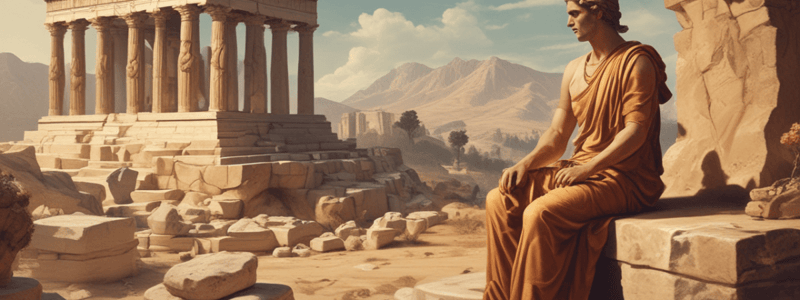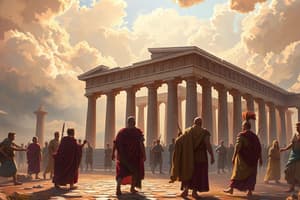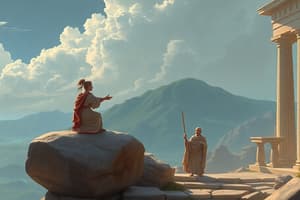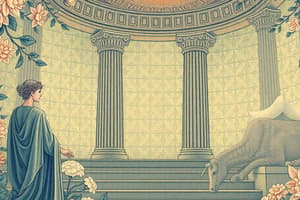Podcast
Questions and Answers
What is the meaning of the Greek words 'demos kratos'?
What is the meaning of the Greek words 'demos kratos'?
- Rule by the people (correct)
- Rule by the king
- Rule by the law
- Rule by the army
What type of democracy was originally developed in Athens?
What type of democracy was originally developed in Athens?
- Monarchy democracy
- Representative democracy
- Oligarchical democracy
- Direct democracy (correct)
What were the terms closely related in the Classical era?
What were the terms closely related in the Classical era?
- Sovereignty, power, and authority
- Freedom, justice, and independence
- Democracy, liberty, and equality (correct)
- Oligarchy, monarchy, and aristocracy
What happened to the practice of direct democracy over time in Greece?
What happened to the practice of direct democracy over time in Greece?
What was the primary inspiration for the revolutions in America and France?
What was the primary inspiration for the revolutions in America and France?
When did respect for Athenian democracy come later in the West?
When did respect for Athenian democracy come later in the West?
What is the most popular form of democracy in use today?
What is the most popular form of democracy in use today?
What is the origin of the name of fraternities and sororities today?
What is the origin of the name of fraternities and sororities today?
What architectural style was influenced by ancient Greece during the 1820s and 1830s?
What architectural style was influenced by ancient Greece during the 1820s and 1830s?
What is the name of the legendary Greek hero of mythical musical ability?
What is the name of the legendary Greek hero of mythical musical ability?
Flashcards are hidden until you start studying
Study Notes
The Legacy of Ancient Greece
- The legacy of ancient Greece has had a significant impact on Western civilization, influencing every European country and those touched by Western imperialism.
- The Classical era (c. 510-323 BC) was the peak of ancient Greek civilization, and many of their contributions have continued to the present day or been instrumental in further cultural development.
Ancient Greek Contributions
- The most well-known ancient Greeks who contributed to modern society came from the legacy of thinkers and philosophers, including Socrates, Plato, and Aristotle.
- Socrates (c. 470-399 BC) was concerned with self-knowledge, love, and moral questions, and created the Socratic method of questioning.
- Plato (c. 427-347 BC) was a student of Socrates and was interested in metaphysics, creating the theory of Forms, which are the natural essences of all things in the material world.
- Aristotle (c. 384-322 BC) was a student of Plato and was interested in "natural kinds," the everyday things made of matter, and created his own school, the Lyceum.
Science in Ancient Greece
- The ancient Greeks were the first to state some of the fundamental problems concerning science, and developed the idea that empirical research could be performed, and that mathematics could be applied to better understand natural phenomena.
- Hippocrates (c. 460-370 BC) was a well-known practitioner of medicine and developed the Hippocratic Oath, one of the earliest recorded oaths of medical ethics.
- In astronomy, the ancient Greeks correctly deduced that the Earth was spherical and developed the geocentric model, which was not questioned in the Western world until the 17th century AD.
Art and Architecture in Ancient Greece
- In the Classical era, sculptors focused on realism and geometric ratios of the body's proportions, creating more humanistic and life-like pieces.
- The Greek temple was a feat of monumental architecture, characterized by rows of tall, intricately fluted and capped columns, bas relief friezes, and obtuse triangular pediments filled with detailed statuary.
- The Parthenon, constructed c. 447-432 BC, is the prime example of Greek temple architecture.
Sports in Ancient Greece
- The ancient Greeks added sports education to their schooling curriculum, using movement exploration to promote the relationship between cognitive function and physical fitness.
- Sports practiced included boxing, wrestling, the javelin and discus throw, the long jump, and horse riding.
- The Olympic Games evolved out of this training around 776 BC, serving to culturally unite the various city-states of the Greek world.
Mathematics in Ancient Greece
- Pythagoras (c. 570-490 BC) was a philosopher and mathematician who developed a way of life based on empirical observations regarding number theory and simple experiments.
- Euclid (c. 325-265 BC) discovered geometry and wrote the first known textbook on mathematics, the Elements, which was the standard in the field for centuries.
Theater in Ancient Greece
- Greek theater evolved from the enactment of religious rituals to the staging of dramatic plays, in the form of comedies and tragedies.
- Tragedy was usually based on myth, especially legendary accounts of crippling insanity and violent family conflict, and often focused on local heroes.
- Aristotle believed that experiencing a tragic production could bring about catharsis and spiritual purification.
Legacy of Ancient Athens for Modern Government
- The legacy of ancient Athens for modern government is democracy, which was developed in Athens around the 6th century BC.
- Democracy was originally a direct democracy, where no elected representatives intervened on behalf of the people, and all Greek citizens were considered equal under the law.
Influence of Ancient Greece on Modern Culture
- The Olympic Games are still held every four years, though now more modernized and clothed than in ancient times.
- The Greek revival style of the 1820s and 1830s inspired many statehouses and buildings, symbolically making them "temples of democracy."
- The Greek Theater in Los Angeles, which hosts the annual Grammy Awards, is modeled after a Greek amphitheater centered on a stage with the facade of a Greek temple like the Parthenon.
Studying That Suits You
Use AI to generate personalized quizzes and flashcards to suit your learning preferences.




